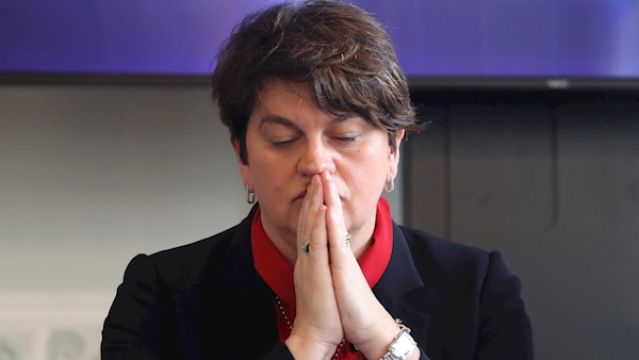Northern Ireland is set for a period of intensified coronavirus restrictions after executive ministers agreed to closures of schools, pubs and restaurants.
This comes as 1,217 new Covid-19 cases and four further deaths were recorded in the North in the last 24 hours, in the region since an extended testing regime was introduced.
First Minister Arlene Foster announced the restrictions at a special sitting of the Assembly today, saying the rising figures were of “grave concern”.
Pubs and restaurants will close for four weeks, with the exception of takeaways and deliveries, while schools will close for two weeks, one of which will cover the Halloween midterm break.
“We fully appreciate that this will be difficult and worrying news for a lot of people,” she said.
“The Executive has taken this decision because it is necessary, and we discussed the impacts in great detail. We do not take this step lightly.”
The moves do not amount to a full scale lockdown similar to that imposed during the first wave of the virus, but the measures nevertheless mark a significant ramping up of the administration’s response to spiralling infection rates.
Retail outlets will remain open, as will gyms for individual training. Churches will also remain open. It is understood a 25-person limit will be placed on funerals and weddings.
The restrictions were agreed after a stop-start meeting of the Stormont Executive that extended past midnight last night and into this morning.
The current restrictions on household mixing are expected to remain as they are, with no mixing of households in private dwellings, with exceptions including those joined in social bubbles, and gatherings in the gardens of private dwellings limited to six people from no more than two households.
The closures of hospitality outlets will come into force this Friday, October 16th. The other measures would be rolled out from Monday, October 19th.
The Exec has given painstaking consideration to next steps.
We know this is hard and that people will be worried about their livelihoods, but we will do everything we possibly can to make sure there are protections in place for businesses, workers and families. Update in morning— Michelle O’Neill (@moneillsf) October 13, 2020
Advertisement
Mrs Foster said the Executive hoped the restrictions would have two impacts.
“First, on the Covid transmission rates which must be turned down now, or we will be in a very difficult place very soon indeed,” she said.
“Second, we believe it marks a point where everyone, each and every one of us, can take stock and go back to the social distancing messaging. That is vitally important.”
In the Republic, Minister for Health Stephen Donnelly has welcomed the decision, saying the North has "made the right decision".
“It is the right move. The situation there is very serious. There are several times higher case numbers for the size of the population,” he told RTÉ radio’s News at One.
Mr Donnelly said that everyone knew the impact restrictions had and that “it takes its toll.”
While the decision would come at a cost, it was the right decision, he said, adding that he would like to see “as close to an all island approach as possible.”
There was a lot of movement between north and south for work, education and essential purposes so the Government was watching the situation very closely, he added.
With regard to restrictions in the Republic the situation was being monitored very carefully as in some counties the growth rate as very high while it was low in others. “The jury is still out” on Dublin as to what the exact situation was, he said, but “certainly” Level 3 restrictions had had an impact.







